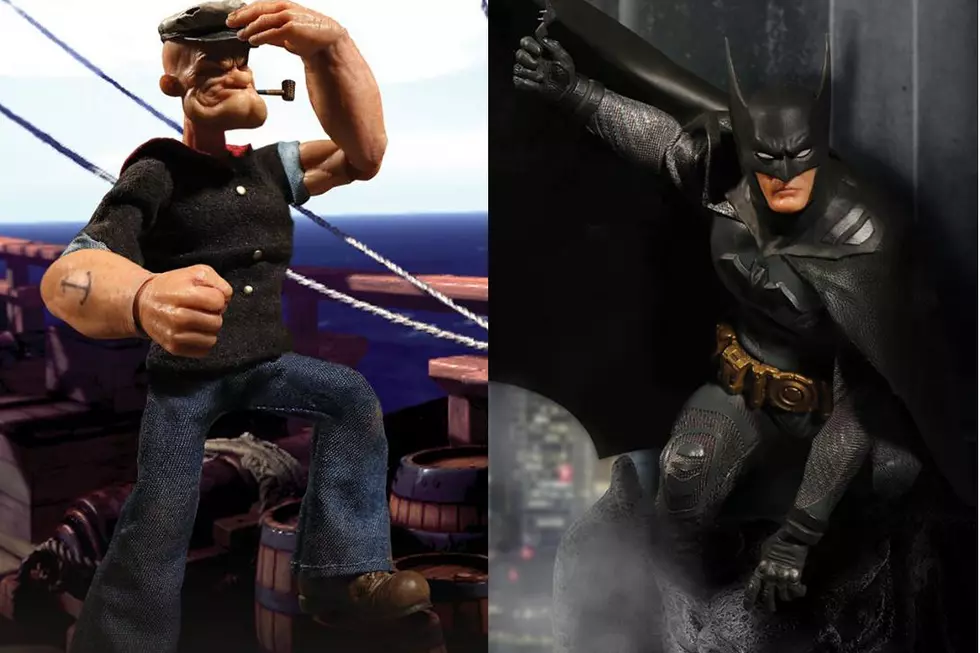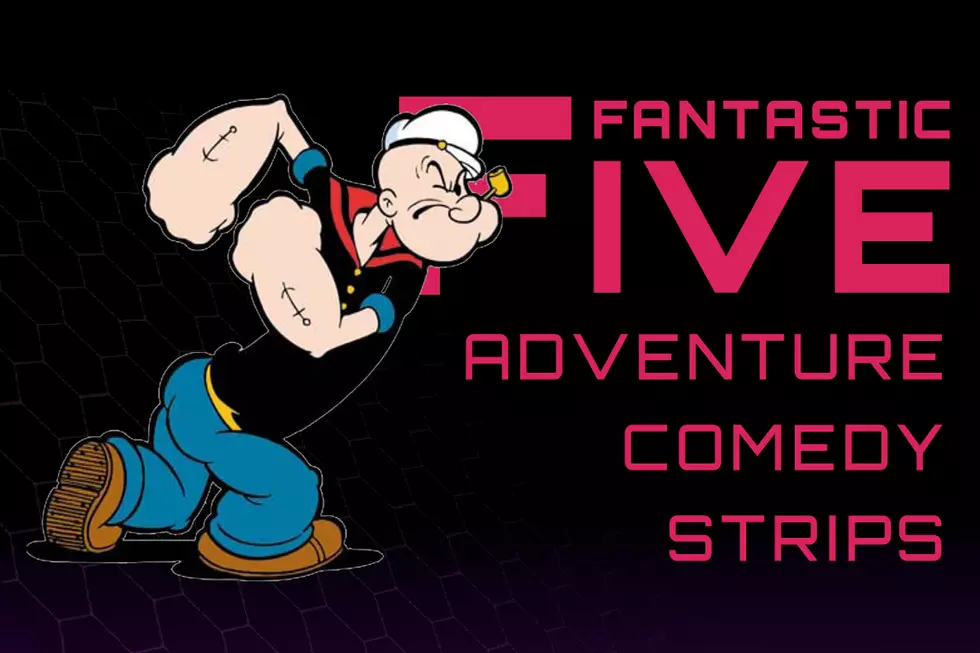
‘Where the Wild Things Are': When the Counterculture Makes Kid Flicks
 I'm almost certainly not alone in expressing my guarded -- even conflicted -- anticipation at the forthcoming release of the "Where the Wild Things Are" film; it's a beloved children's classic filtered through a thrift store sheet-staining hipster's wet dream. Spike Jonze, Dave Eggers, Catherine Keener, Karen O -- oh yeah, and was the Arcade Fire in movie trailer? Yes, of course it was. (And surely volumes could be penned about the fact that fourth song on the soundtrack, "Worried Shoes," was penned by bi-polar-sufferer-turned-perennial-hipster-favorite, Daniel Johnston.)
I'm almost certainly not alone in expressing my guarded -- even conflicted -- anticipation at the forthcoming release of the "Where the Wild Things Are" film; it's a beloved children's classic filtered through a thrift store sheet-staining hipster's wet dream. Spike Jonze, Dave Eggers, Catherine Keener, Karen O -- oh yeah, and was the Arcade Fire in movie trailer? Yes, of course it was. (And surely volumes could be penned about the fact that fourth song on the soundtrack, "Worried Shoes," was penned by bi-polar-sufferer-turned-perennial-hipster-favorite, Daniel Johnston.)
Another potential candidate comes in the form of pretty much any Tim Burton film -- hot shot director, a liberal dose of Johnny Depp, and a soundtrack by that guy from Oingo Boingo. Even those Burton films that seem primarily geared toward children (see: "Pee-Wee's Big Adventure," "The Nightmare Before Christmas") oft seem targeted more toward the director's own loyal fanbase than some Hollywood exec's calculation regarding the potential interests of an average American elementary school student.
Here's the thing, though: we mustn't immediately write off moviemaker's tendencies toward self-pleasure. In fact, it's often directors' compulsion toward molding pictures in their own image that help separate classic children's films from the vast majority cookie-cutter kids crap that comes through the Hollywood pipes. Entertainment for children is often safe to a fault. Parents love safe. Kids, on the other hand, love weird sh-t.
 I'd hesitate to present myself as some sort of standard for average, well-adapted children (a sentiment my elementary school teachers would no doubt waste in echoing), but all of this thinking about "Where the Wild Things Are" keeps bringing me back to my own childhood favorite: "Popeye."
I'd hesitate to present myself as some sort of standard for average, well-adapted children (a sentiment my elementary school teachers would no doubt waste in echoing), but all of this thinking about "Where the Wild Things Are" keeps bringing me back to my own childhood favorite: "Popeye."
Not the E.C. Segar comics or the Fleischer Studios cartoons (though both unquestionably had their impact on my own decidedly skewed entertainment consumption), but rather that now largely forgotten live-action cinematic adaptation from 1980.
Directed by Robert Altman, produced by Robert Evans, written by counter-cultural cartooning legend Jules Feiffer, and scored by Mr. Rock 'n Roll Lost Weekend himself, Harry Nilsson. The movie starred Robin Williams (who no doubt spent much of the film riding the white pony) and 70s Altman favorite, Shelley Duvall, whom you probably know best from all that time she spent acting terrified of Jack Nicholson in "The Shining". (A small, but important side note: producer Evans reportedly wanted to give the leads to an even more bizarre pairing: Dustin Hoffman and Gilda Radner and/or Lily Tomlin)
"Popeye" is, as one might suspect, a weird goddamn film. The direction is every bit as Robert Altman as, say Nashville, from a surprisingly complex plotline to his customary overlapping dialog. The music, too, in spite of being sung by the principle cast, is unmistakably Nilsson. Penned at the height of the singer's alcoholism, most parties involved in the film attempted to dissuade Altman from working with the one-time Beatles favorite. "Hurray hurray Sweethaven / Flags are wavin' / Swept people from the sea / Safe from democracy / Sweeter than a melon tree / Put here for you and me," the townspeople sing in "Sweethaven."
During the film, Wimpy puts Swee'Pea down as collateral for a bet, a climatic scene unfolds with a rubber octopus (apparently there were some budget issues at play), and Bluto literal turns yellow upon losing a fight. As I said, it's a weird goddamn film.
Popeye did reasonably well at the time, becoming Altman's second highest-grossing film (after "M.A.S.H.," naturally). Critics loved it or hated it (Roger Ebert fell into the former category). Me, I loved the hell out that movie, making my mother draw anchors on my forearms before marching around the house to a vinyl version of the film soundtrack. Clearly I wasn't the only one who was deeply affected by the film, either. The Nilsson-penned, Duvall-sung "He Needs Me" later popped up on the soundtrack for Paul Thomas Anderson's "Punch Drunk Love."
That, sadly, remains the only way to legitimately get any song from the Popeye soundtrack digitally or on CD. The album went through a run on vinyl, cassette, and 8-track in the 80s, but has since gone completely out of print. (Much to the chagrin of Nilsson completists, Harry's demos of the songs have never been available, though they are acquirable through less legitimate means-which, off the record, I highly recommend to fans of the singer.) The movie itself has been issued twice on DVD, both in lackluster versions featuring identical content, the latter of which carries an irritating "I Love the 80s" Edition branding.
"Popeye" has, by pretty much all accounts, been effectively buried and forgotten.
With an entertainment industry so driven by its own self-perpetuating nostalgia, its hard to imagine a similar fate befalling "Where the Wild Things Are." The studio system has become expert as squeezing every ounce of life out of its properties, even those it was likely hesitant to have greenlighted in the first place.
What "Popeye" does demonstrate, however, is the way in which seemingly dissonant forces of countercultural entertainment can create a critical mass of quirky children's entertainment. And if those kids' hipster parents also derive some pleasure from the experience, we can't really hold that against them, can we?
Brian Heater is the Senior Editor at PC Magazine, and the Editor-in-Chief of The Daily Cross Hatch.
More From ComicsAlliance
![Mezco’s One:12 Collective Makes Marvel and DC More Memorable Than Ever [Toy Fair 2017]](http://townsquare.media/site/622/files/2017/02/IMG_2587.jpg?w=980&q=75)





![Fox News Said Some Incredibly Stupid Bullsh*t About Comics Again [Video]](http://townsquare.media/site/622/files/2014/09/Fox01.jpg?w=980&q=75)


